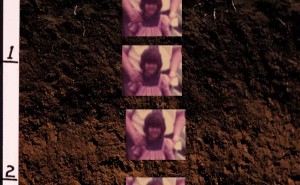I wrote a letter to Heidi Bub, the woman featured in Daughter from Danang while I was in New York. I haven’t been able to stop thinking about her since I arrived in Ohio. I was really troubled by the way she was depicted by the directors and producers of the film. It’s because of this kind of insensitivity and exploitation that I’ve never allowed someone else to tell my story. I believe there is more to her than what the film portrays and I understand the isolation and guilt she must feel. I am familiar with the unrealistic set of emotions and behaviors expected from adoptees. Intense moments such as these should not be so harshly judged. I hope as we move towards a new understanding and perspective on adoption, these types of reunions will be addressed with more sensitivity. Thank you Ethnically Incorrect Daughter for your insight on the movie.
I’ve been shooting for the documentary in Ohio for almost two and half months now. Here’s something from the Ross County Fair:
The author of the book “Matching and Its Critics in American Adoption,” Ellen Herman spoke at the University of Pittsburgh on Sept 29th. Herman is currently a professor of History at the University of Oregon. Thanks to The Daily Bastardette for the the following:
From The Daily Bastardette, on Herman’s “Matching and Its Critics in American Adoption”:
- Her current book considers the history of child adoption during the twentieth century as a case study of social engineering, or kinship by design. The historical claim of kinship by design has been as simple as it has been ambitious: to reduce uncertainty and increase certainty in family formation. Kinship by design promised to inject safety, naturalness, and authenticity into a family form culturally marked as hazardous, artificial, and less real than the “real thing.” The book will cover a range of efforts to regulate the adoption process as well as study and help members of adoptive families. It suggests that the adoption story has as much to tell us about the history of the welfare state, scientific authority, and therapeutic culture as it does about childhood, family life, and other experiences we classify as “private.”
Bryan Thao Worra said: “For transcultural adoptees, our lives are written in pencil. Everything you think you know about yourself can change in an instant.”
As I listen to audio of my natural mother in Costa Rica from two years ago, [that I recently had transcribed and translated for me], I feel more and more confused about who my mother was and how I spent the first four years of my life. I’ve grown accustomed to my adoptive parents altering the story of my childhood, now I’m hearing my biological family do the same. I sense they feel a need to protect me, but no matter how much they try to sugarcoat the past, the “unpleasant truth” remains my past, and I deserve to know it fully.
[youtube=http://www.youtube.com/watch?v=NQy5VRP6Lhc]
This short video is an excerpt from my documentary feature film “Imaginary Mothers,” which is now in production.
Since I’ve begun this documentary I’ve come across amazing blogs and websites that speak for adoptees and natural parents. I found the Adopted Life Website particularly moving, not necessarily for the statements made by the authors, but for the amount of searches and postings made by adoptees and natural parents⏤it’s overwhelming. It breaks my heart to see the deep desire people have to connect to their natural relatives. Adoption advocates might think twice about their message if they took the time to go through the hundreds of names on this list. The postings include adoptees looking for birth parents and parents looking for their natural children.
The title “Imaginary Mothers” was inspired by the book Cultures of Transnational Adoption. In the chapter “Birth Mothers and Imaginary Lives,” Laurel Kendall discusses her curiosity towards her adopted child’s natural mother. She writes about the complexities of the trichotomy, the differences in class, race, and opportunity, and how they will affect her life and her child’s life. She discusses the unkown, the lost time and “unfinished stories,” and subsequently the need for both (adoptive parent and adoptee) to fantasize and imagine the natural mother.
Kendall did not consider that one day her adopted child might have the need to envision her as a natural “mother.” I use this title to refer to the “imagining” phenomenon that I’ve experienced with both my mothers. I feel an intense lack of connection to both women. They both seem imaginary to me, even when I’m in the same room with them, I fail to connect. I wonder if this film will bring me closer to either one?

excerpt from poem by Julia Chinyere Oparah
This red earth
claims me
runs through my veins
calling me to surrender
a lifetime of unbelonging.
Sinking to my knees
in my father’s compound,
I feel the dark coiled roots of unspoken bitterness
Loosen their grip on sinew and bone
Releasing my ribcage.
I take my first breath
Drawing the cicada-laden dusk
Deep into my belly
Letting go of memories
of an ancient hunger
I have not claimed this red earth
She has claimed me
She has renamed me
placing unfamiliar consonants on my tongue.
Daughter of Umochoke
Blood of Mbierre
Child of Obazu.
She does not ask me to swear allegiance
Does not demand that I choose
or forget.
She is not jealous or possessive.
In moments of stillness
I hear her whispering
words of comfort and solace
In a language I never learned.
